|
|
|
Sort Order |
|
|
|
Items / Page
|
|
|
|
|
|
|
| Srl | Item |
| 1 |
ID:
160411
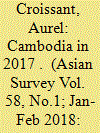

|
|
|
|
|
| Summary/Abstract |
After local elections in 2017, the Cambodian People’s Party intensified its attacks on free media, NGOs, and the Cambodian National Rescue Party. Meanwhile, stronger links to China and waning Western leverage are enabling Prime Minister Hun Sen to transform the post-1993 multiparty system into a patrimonial dictatorship. Cambodia enjoyed strong economic growth but saw little improvement in its weak institutional framework, in social justice, or in economic competitiveness.
|
|
|
|
|
|
|
|
|
|
|
|
|
|
|
|
| 2 |
ID:
164958
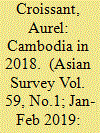

|
|
|
|
|
| Summary/Abstract |
In 2018, ever-incumbent Prime Minister Hun Sen scored a landslide victory in the Cambodian general elections. Three factors in particular explain this outcome. First, the elimination of the main opposition party, whose strategy of a peaceful election boycott failed. Second, favorable economic conditions and government handouts of spoils to constituencies that traditionally supported the opposition. Third, the weak leverage of the United States and the EU, and the Hun Sen regime’s strong links with China.
|
|
|
|
|
|
|
|
|
|
|
|
|
|
|
|
| 3 |
ID:
121663
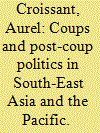

|
|
|
|
|
| Publication |
2013.
|
| Summary/Abstract |
The 2006 coups in Fiji and Thailand-as well as the 2012 incident in Papua New Guinea-have sent timely reminders that military coups remain a threat to vulnerable democracies in South-East Asia and the Pacific. This article explores the interplay between structural factors that can create coup risks, the 'coup-proofing' strategies of political leaders and the occurrence of military coups. While the article examines the region as a whole, it pays particular attention to Myanmar (Burma), Thailand, Indonesia, Fiji and Papua New Guinea. Borrowing from the work of Belkin and Schofer, it argues that the level of coup risk in each country can be assessed by analysing the extent of regime legitimacy, the strength of civil society and the frequency of military coups in the past. By combining this analysis with an evaluation of coup-proofing strategies, the study discusses likely scenarios for the five focus countries as far as the likelihood of coups or, alternatively, the establishment of stable civilian control is concerned.
|
|
|
|
|
|
|
|
|
|
|
|
|
|
|
|
| 4 |
ID:
076663


|
|
|
| 5 |
ID:
076654
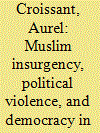

|
|
|
| 6 |
ID:
088881
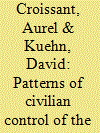

|
|
|
|
|
| Publication |
2009.
|
| Summary/Abstract |
Successful institutionalization of civilian control of the military is a necessary condition for the consolidation of democracy. This is particularly relevant for East Asia, where the military used to be a key player in the previous authoritarian regimes. This article analyzes the changes, advances, and setbacks in achieving civilian control in five countries that have made the transition from authoritarian to democratic rule: Indonesia, the Philippines, South Korea, Taiwan, and Thailand. The empirical analysis is built on a conception of civilian control that distinguishes three areas of political decisionmaking: political recruitment and overall public policymaking, national defense, and internal security. The study shows that only in Taiwan and South Korea have civilians succeeded in curtailing military influence in politics. In contrast, in Indonesia, the Philippines, and Thailand, the military has shown itself more or less resilient in guarding its prerogatives in the postauthoritarian era. This seriously impedes the democratically elected authorities' effective power to govern in these countries and has led to democratic deterioration in Thailand and the Philippines. The article highlights three arguments to account for the profound difference between the cases: historical legacies of authoritarian rule and the path of democratic transition, the internal security role of the military, and the relationship between development and democratic consolidation.
|
|
|
|
|
|
|
|
|
|
|
|
|
|
|
|
| 7 |
ID:
100303
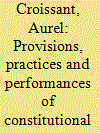

|
|
|
|
|
| Publication |
2010.
|
| Summary/Abstract |
This analysis of the institutional design and actual performance of constitutional review in five newly democratized nations in East Asia shows that during the last two decades the judiciary has come to play an increasingly important political role in South Korea, Taiwan and Indonesia. Constitutional courts in these three countries are more active in counterbalancing executive and legislative power than ever before. This however contrasts with the experiences of Thailand and Mongolia where constitutional courts were unable to fulfill a similar function. The discussion for potential explanations for this cross-national variance in court performance supports the critique in parts of the scholarly literature against purely institutional, cultural and structural explanations. Rather, the degree of political uncertainty and diffusion of political power are critical determinants for understanding why politicians comply with court judgments, or attempt to marginalize justices. In addition, the relationship between institutional support, compliance and the area of judicial review matters. In this regard, one lesson of the East Asian comparison is that a too early introduction of review of separation of power conflicts could actually make things worse, by threatening the court's authority and marginalizing its influence. This represents a danger often neglected in the democratization literature that claims judicial control of horizontal accountability mechanisms would necessarily help to consolidate democracy.
|
|
|
|
|
|
|
|
|
|
|
|
|
|
|
|
| 8 |
ID:
061415
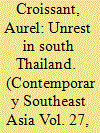

|
|
|
|
|
| Publication |
Apr 2005.
|
| Summary/Abstract |
In the past three years, southern Thailand has seen a rise of ethnic-based violence in its southernmost provinces. The principle objective of this article is to examine contours, causes and consequences of this recent development. The main argument is that although several contentious religious, cultural, economic and political issues lie at the root of ethnic violence, the drift toward militancy in the past three years must be explained by other factors. Historical concerns, religious differences, and social and economic marginalization cause local grievances and a latent crisis in inter-ethnic relations in south Thailand. Nonetheless recent Islamization of Muslim minority identity, policy failures of the sitting government and low quality conflict management account more for the increased violence in recent years. These factors created changes in the “enabling environment” that are allowing insurgency in south Thailand to grow. While the overall assessment for conflict resolution in the short term is negative, the political fallout of the unrest may strike the already faltering democratic consolidation a heavy blow
|
|
|
|
|
|
|
|
|
|
|
|
|
|
|
|
| 9 |
ID:
129635
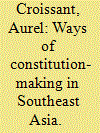

|
|
|
|
|
| Publication |
2014.
|
| Summary/Abstract |
This article analyses eleven cases of constitution-making in eight Southeast Asian countries since 1986. It investigates design choices and actors' interests, the link between the form of the political regime and the extent to which process designs matter for the legitimacy of the constitutional orders in the region. In doing so, the article demonstrate that the link between the form of the political regime and the extent to which constitution making is inclusive or participatory is less clear cut. While we would expect better opportunities for public participation and border inclusion of extra parliamentary actors in constitution-making in democratic environment, the empirical evidence is mixed. If and how this matters for public support for a constitution and the social acceptance for the constitutional order is not clear. In fact, the Southeast Asian experience seems to indicate that procedural legitimacy is less relevant for the acceptance of a constitution than the legitimacy that derives from the day to day plebiscite by citizens and elites.
|
|
|
|
|
|
|
|
|
|
|
|
|
|
|
|
|
|
|
|
|